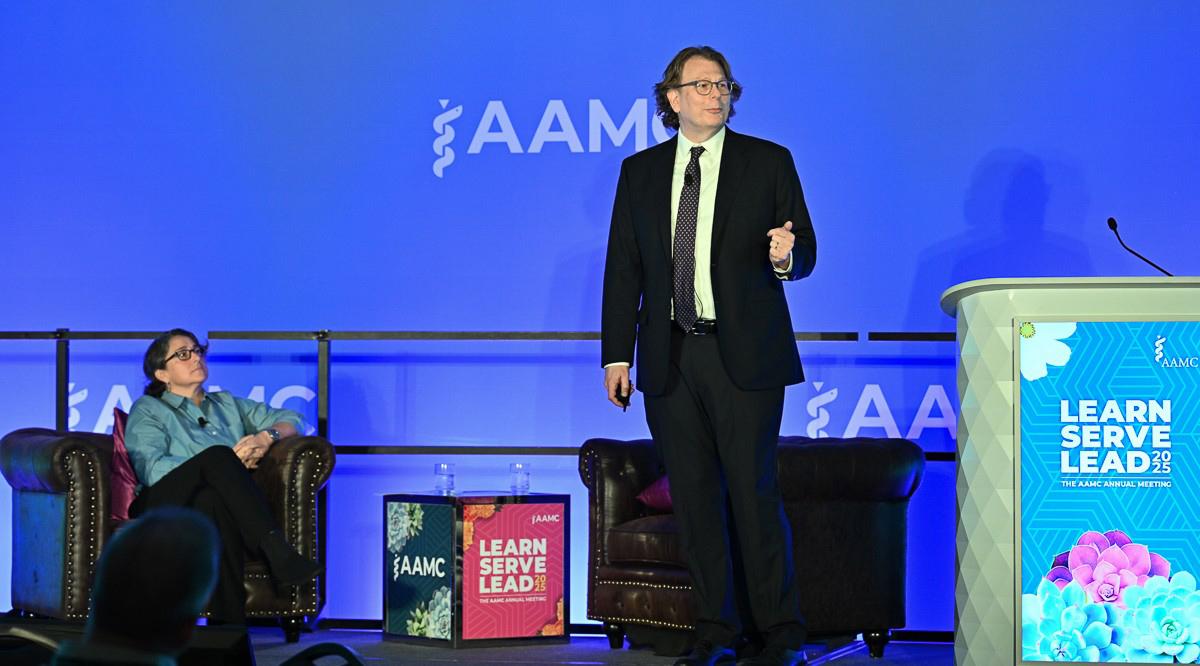The day in 2018 that a child with measles showed up at his New York City hospital was a watershed moment for infectious disease specialist Adam J. Ratner, MD, MPH. Part of the measles outbreak that emerged from Orthodox Jewish communities in Brooklyn and New York’s Rockland County, it heralded a comeback of the highly contagious disease in communities around the country that continues today.
“What I learned over the ensuing months changed the way that I thought about vaccines, about how we communicate, and about what measles in particular, but vaccine-preventable diseases in general, mean in terms of how we think about public health,” he told attendees of the session, “Outbreak of Mistrust: What Measles Teaches Us Now,” at Learn Serve Lead 2025: The AAMC Annual Meeting, on Tuesday, Nov. 4.
In his book, Booster Shots: The Urgent Lessons of Measles and the Uncertain Future of Children’s Health, Ratner traces the history of measles outbreaks, including its inequitable effects on lower socioeconomic groups, the eventual development of a highly effective vaccine, and the rise of vaccine hesitancy. What he discovered is that measles outbreaks are often hyper local.
“The story of measles is largely about our communities, not even about national or state policy matters,” he said. “This all plays out at the level of not only counties, but in school districts and neighborhoods. The reason that we had those outbreaks in New York was because of targeting of an insular community, and they were preyed upon by the anti-vaccine movement to the detriment of children.”
The session was moderated by Andrea T. Cruz, MD, MPH, professor of pediatrics at Baylor College of Medicine, deputy editor of Pediatrics, and PI for PECARN, who offered questions from colleagues as well as those who attended the session.
How do doctors navigate the vaccine landscape when trust in both science and government policy is fragile? Cruz asked Ratner.
“We, as pediatricians, as a medical community, have to rely on the trust that we spent years building with families,” Ratner said. “And while there are people who are dug in, most families just want to know if we think it’s safe and what we do for our own child. I try to honor the questions that people come with but also remember that the questions that they're asking might not actually be the questions that they want the answer to.”
“Certainly, as pediatricians, the thing we can agree on is that [we want] your child [to] be healthy and grow into a healthy adult,” he added. “That should resonate regardless of one's political ideology.”
Countering vaccine hesitancy
When one attendee requested guidance for conversation with parents, Ratner mentioned the American Academy of Pediatrics toolkit, which includes strategies like motivational interviewing. Such tactics can take time and may require more than one conversation.
“You have to be in it for the long term,” Ratner said. Even when doctor visits are short, he advised, “You can deliver the message and move on.”
Every exposure may contribute to the likelihood of success. Ratner said that a primary care pediatrician he knows displays detailed vaccine information on the wall in the waiting room.
“We're asking people to trust us and to allow their healthy child to receive what is a medical intervention,” he added. “It's something that we hold to a very high degree of safety, but if a parent has the kinds of questions you ask about a medical intervention — What are the risks? What are the benefits? — we have to be ready to answer those questions for that individual family.”
Ratner offered another strategy to get to a parent’s “yes”: “Sometimes it's helpful when having these conversations to figure out who is the decision maker in the family,” he said. “And if it's a teenage mom who's there with her young child, then maybe the decision maker is her mom. If so, addressing the questions that the child's mother has, might not move the needle. You can say, ‘Hey, do you mind calling your mom so we can all chat about this together?’”
Taking a stand
More than thoughtful discussion is required today, however, Ratner said, and he urged doctors to add their voices to the conversation at large.
“We're past the point now where [answering questions in the office] is all that we do,” he said. “We pediatricians have to be out there engaging with these questions on a community level, a state level, a national level, because those conversations are critical and they’re happening with or without us.”
“We have to realize that as clinicians, the amount of time that families spend in the office with us is minuscule in comparison to the time that they spend with folks in their community in different realms, whether it’s their religious community or their neighborhood community,” added Cruz. “If we want to make inroads, we do have to step a little bit outside of our comfort zone.”
One audience member asked how to restore a community’s trust in the wake of medicine’s betrayals, such as during the Tuskegee experiments, when Black men with syphilis were left untreated even after a cure was found, so that the disease could be studied.
According to Ratner, acknowledging things that have happened in the past is very important.
“This becomes a longer conversation with families but if that's the conversation that they need to have, it's one that we should be prepared to have,” he said. “But I would say then that we’re also happy to talk about why I think this particular vaccine is important and why I think the risks are outweighed by the potential benefits. More than likely, if they're sitting with you, there are things that they will trust and think of at that 15-month visit, when the child is there for their MMR (measles, mumps, rubella) vaccine.”

